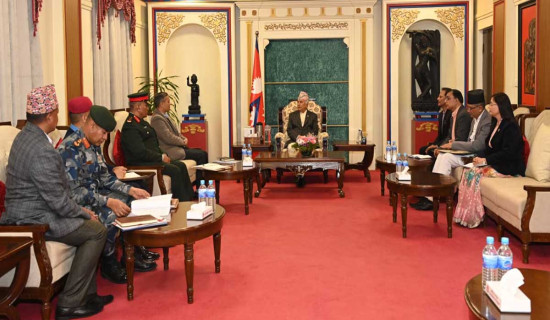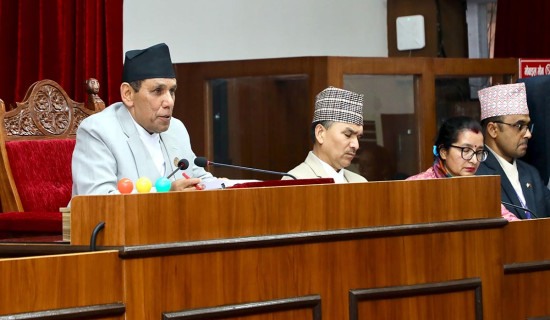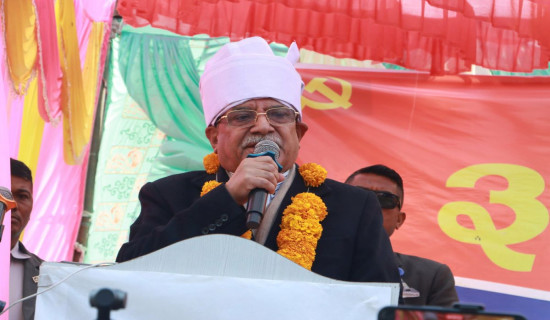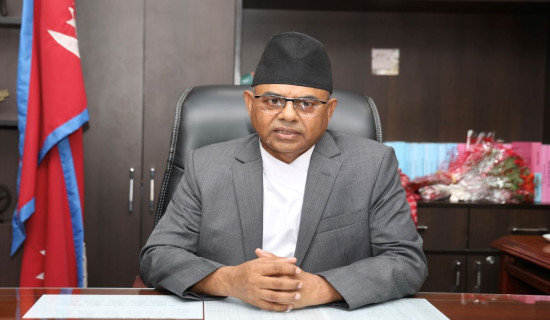- Saturday, 14 February 2026
Why Does A Good Salary Matter?
The National Statistics Office (NSO) has revealed that Nepal's per capita income has reached US$ 1456 after an increment of US$ 51 in comparison with the year before. The report unveiled by the NSO last month determined the figure equivalent to around NPR 195,000 per year. Taking down to a month, the figure would be around NPR 16,200. The minimum wage that the government has set is 17,300 per month. Getting in-depth, the World Bank has reckoned that the international poverty line is $2.15 per day. With a total of $1456, it becomes $3.98 per day in the Nepali context. Thankfully, Nepal is not below the poverty line as seen from the report here. But, that does not indicate it all.
Basic requirements – like food and shelter – can anyway be managed through that amount. But, in the real picture, there are large numbers of families where one single member is responsible for whole financial accountability, there are families who have been earning the minimum wage and managing the whole family. Living household in Nepal is expensive - be it rent, or fooding. Every individual wants to ensure that their children are getting a good education too. From the prices of vegetables that they pay to educational fees that they are troubled with - living costs are certainly high. With that salary, it is almost impossible for an individual to survive in cities like Kathmandu, Pokhara, Butwal, Itahari, Biratnagar, Dhangadi, etc.
Basic demands
Average Nepalis do not hold high expectations. They have only a basic set of demands. They want to eat a good meal two times a day, and have some delicious meals during the weekend. They want to own a vehicle (usually a two wheeler) for easy travel and dream of building their own home from their income. They want to give their children a good education and save something so that unforeseen medical expenses can be covered at the time when required. This can't be regarded as 'ambitious'. Nepalis are just into a basic layer of demand.
The irony part here is that even a high-level salary-earning employee has to struggle to maintain this. No doubt, with the passage of time, there has been a rapid increment in employees' salary. But when this is tied up with the inflationary rate, the level cannot be regarded as good enough. Employees have to struggle at larger layers to manage their overall set of living expenses.
After all, the salary level of Nepal is pretty low compared to the whole of South Asia. Be it in terms of per capita income level or other dimensions - they are not properly justified. This has been an important reason why brain drain takes place in Nepal. Earlier, talented and intelligent students used to dream of doing jobs in Nepal after their graduation. But with changes that took place, they no longer dream of staying in Nepal, but rather seek a future abroad. Colleges are getting closed because students have stopped preferring to reside in Nepal.
For economic transformation, there must be a high level of consumption within the country. To increase consumption, people must hold money with them. To hold the money for expenditure, they should have disposable income with them. Only when there is a higher level of disposable income, do people tend to make expenses and spur economic activities.
Quality of life
Higher consumption will directly stimulate economic activity through which even the government can obtain higher tax revenues. Increased salary will increase purchasing power, which in turn will boost their consumption, improving quality of life. It will also enhance employee motivation and productivity, so employees will feel more valued, leading to higher job satisfaction. Competitive salaries attract skilled workers, ultimately reducing turnovers and the costs associated with hiring and training new employees. It will also help to reduce poverty and inequality, narrowing down the wage gap as well as inequality. It is understandable, however, that increased salary will also send inflation soaring and there will be other negative impacts on businesses as well.
That said, its positive sides dwarf the negative ones. It will raise the living standard and go a long way to retain talented people indispensable to fuel economic growth. Also, corruption will decrease. News regarding government employees resigning from their jobs and flying abroad, and university toppers applying for EDVs are all because of the low-paying jobs that surround them. A good wage and a good salary are not only economic pride but an important tool to boost employees' morale as well. After all, an employee will be in a jolly mood only when s/he goes to office without any financial tension in mind. An employee who is struggling to pay rental expenses, and children's educational fees cannot work with full concentration. For rapid economic transformation, Nepal’s salary requires drastic reformation.
(Regmi is Deputy Manager at Rastriya Banijya Bank Ltd., currently working in Treasury Department.)
















